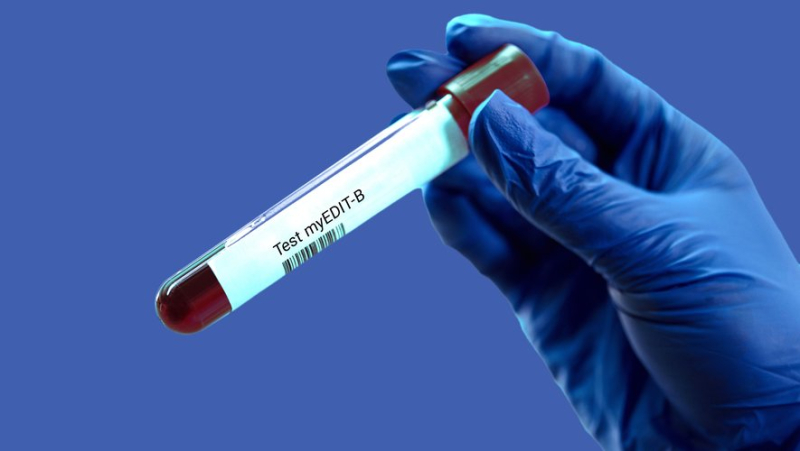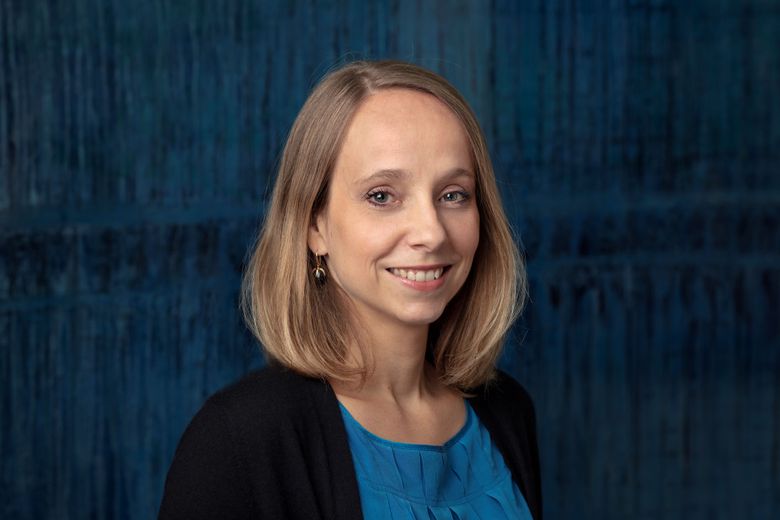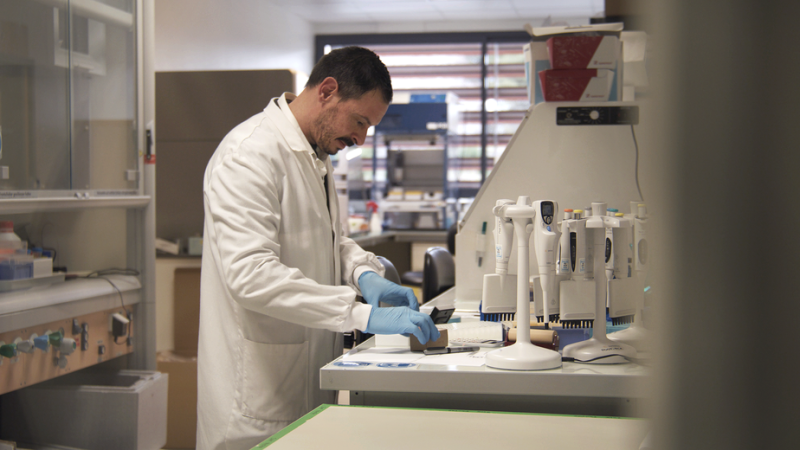Bipolar disorders: will the test developed in Montpellier revolutionize the diagnosis of the disease ?

Un test à partir d’une simple prise de sang. PHOTO SYNELAB
Supported by an effective communication campaign, my-EDIT-B, the first blood test for bipolarity invented by a Grabels start-up, and put on the market on April 1, offers great hope for detecting the disease. It also raises some reservations. Whether one is enthusiastic or calls for caution, history is largely written in Montpellier.
The artists Kanye West and Mariah Carey, Demi Lovato, but also the American actors Catherine Zeta-Jones and Ben Stiller, the French Benoît Poelvoorde, "bipolar like a lot of people", broke the taboo.
Will Alcediag, a start-up based in Grabels, north of Montpellier, in turn mark the history of bipolarity? It opens today . great hopes in the identification of this psychiatric illness which alternates between “manic”, almost euphoric, and “depressive” phases, sticking for a long time to those affected with the label today. hui obsolete of "manic-depressive". 1% of the French population is affected.
Bipolar disorders in brief
Ranked among the 10 most disabling pathologies according to the World Health Organization, bipolar disorders affect at least 1% of the population, and up to 2.5% according to projections. more pessimistic, they are underdiagnosed. Often detected late, they are associated with social difficulties, addictions, dangerous behavior and suicide attempts for one in two patients. The causes of the disease are multifactorial, and treatments combine mood stabilizers, often lithium, psychotherapy follow-up, or balanced lifestyle advice.
Supported by an effective communication campaign and relayed by numerous media, the myEDIT-B blood test from Alcediag, the first in the world allowing & quot;differentiate depression and bipolar disorders", two illnesses that are often difficult to distinguish, leading to delays in diagnosis and an average delay of 8 to 10 years in France, recalls the&rsquo ;company, arrived on the market on April 1, the day after World Bipolar Disorder Day.
It has been awaited for months: the CNRS, associated with the French industrial giant Alcen, already announced it a year ago.
"RNA sequencing in blood coupled with an algorithm"
Reserved for adults, the test, available on medical prescription and accessible only via the network of 400 Synlab laboratories, which has around fifteen locations in Occitanie, "based on next-generation sequencing of RNA in the blood, coupled with an algorithm based on artificial intelligence", specifies the press release , which reports "performance above 80 %".
Not reimbursed by social security, it costs 899 euros.
"We already have requests", indicates biologist Florian Scherrer, medical director of Synlab, who implemented places a secure system dedicated to testing: "People come to take a blood test with the prescription of their doctor who must also sign a clinical information sheet, and their consent form. This is classic sampling work, then the sample, packaged in a specific tube, leaves for Montpellier.
"It is not infallible, it is an aid to diagnosis"
Alexandra Prieux, general director of Alcediag, describes the rest of the journey: "The analyzes are carried out in Montpellier, where the test has been developed. We then send the result to the prescribing doctor within four weeks, it is a complex analysis which requires time".

Alexandra Prieux is general director of Alcediag. DR
The timing is not trivial: "When we consult a psychiatrist, we generally have a delay of one month between two meetings".
What information does the test provide ? "It has a sensitivity and specificity greater than 80 %. It is not infallible. It’is a diagnostic aid in patients treated for symptoms of moderate or severe depression". The stakes are high: a treatment for depression prescribed to a bipolar patient risks worsening the illness.

The analysis of all blood samples is carried out at Alcediag in Grabels. DR
Two cohorts totaling nearly 400 patients, 255 in Montpellier, 143 in Switzerland, two patent filings, CE marking, an ongoing study to demonstrate the usefulness in clinical practice, marketing started in Italy at the end of 2023&hellip ; Alexandra Prieux prefers to list the work of "more than ten years of research" rather than dwell on reservations of the medical world.
As much as psychiatrist Chantal Henry, leading figure in bipolarity at GHU Paris psychiatry (formerly Sainte-Anne hospital), welcomes the arrival of a biomarker which "should allow adapted and earlier treatment".
“We continue the search”
Medical advisor to Alcediag, Dr. Jean-Philippe Lang, psychiatrist, brushes aside the criticism. "The biomarker has been validated", he assures critical colleagues, notably the French Association of Biological Psychiatry and Neuropsychopharmacology: "A learned society is in its missions and its postures. What more could you ask for ? We have the CE marking. Two studies have been replicated, we are continuing the research with another clinical benefit study, to come at the European level in partnership with the GHU Paris psychiatry. We are supported by the BPI and by Chantal Henry, a great specialist… It’s always like that the first time. We heard the same things when RNA vaccines arrived, criticism is part of innovation, especially when it is driven by the private sector, deplores Dr Lang, who concludes: & quot;At the AFPBN, no one questions the focus of the research, we are rightly concerned perhaps about a lack of evidence, but these same learned societies are working on the same domains.
"This test is a hope"
And Alcediag refers to a patient who testifies to the hell of medical wandering : "This test, even if it is not infallible, it is a hope", slips Michel L., who lost his job and his health in the 8 years necessary for the diagnosis of his bipolarity, while he was being treated for depression: "Eight years, it was terrible, for me and for my loved ones , I sank", testifies the fifty-year-old, now "into normality".
At Synelab, Florian Scherrer also has no doubts:"We will have to wait years for a reimbursement, the practitioners did not want to wait. In France, we are often the last in this type of authorization.
Four years ago, in Montpellier, the same public-private consortium, CNRS/Alcen, via the Sys2-Diag laboratory of Alcediag this time, failed to disseminate on a large scale its saliva test to detect Covid, after a minimum validation of the HAS.
This time, the different strategy may pay off.
Too early on the market ?
"For a diagnostic test to be scientifically valid, ethical and usable in clinical practice, its development must meet strict criteria. To date, no test meets these conditions: on March 28, the AFPBN (French Association of Biological Psychiatry and Neuropsychopharmacology), which promotes the scientific study of psychiatric conditions, warned, without citing it, against the use of the Alcediag screening test.
President of the AFPBN, Professor Emilie Olie, psychiatrist at Montpellier University Hospital, will not go beyond the press release.
Another representative of the association, Boris Chaumette, Inserm researcher, teacher and psychiatrist at GHU Paris (Sainte-Anne hospital, which is a reference in psychiatry) is more direct: "The level of proof is not reached. Only one article has been published in the journal Translational Psychiatry, based on the study carried out at the Montpellier University Hospital. This is minimal work. We are told that the test is validated, but we show nothing and we do no better than the questionnaire which is used to detect bipolarity in patients with a mood disorder, the "Mood Disorder& ;quot;, which has a sensitivity of 0.73 and a specificity of 0.90. But we tell patients that it exists…", deplores the psychiatrist, joined by the Fondamental Foundation, dedicated to research into psychiatric illnesses.
Marcel Dassault Prize 2022
Raoul Belzeaux, PU-PH in psychiatry at Montpellier University Hospital, winner of the 2022 Marcel Dassault prize for his research on… a test for detecting bipolarity, also patented, but on another track, the dosage of cytokines, substances which allow the cells of the immune system to communicate with each other, is also doubtful: "I am very surprised that they are getting involved in marketing, at a time when we don't live a week without a health scandal. We cannot ask people to pay for a test without a guarantee of quality, when the studies have not been completed. This is a lack of caution.
A fine player, he admits that with his project, "very advanced", he was "overtaken by Alcediag". "I hope it works, and I m’would congratulate it if an announcement effect did not risk sowing doubt about all the future screening systems for bipolarity and psychiatric illnesses.
The French government is very committed to bringing projects to fruition: Propsy, the program of the national research agency to "develop precision psychiatry" has put 80 million euros on the table as part of France 2030 around the four most disabling pathologies, including bipolarity. First challenge: "Discover prognostic biomarkers".
"In a slightly more cautious approach" and with "fewer resources", Raoul Belzeaux test, after two initial studies on patients, is entering a new recruitment phase, 660 people over two years. "We will be credible competitors", he promises. "We are addressing general practitioners, and our test will be cheaper, around a hundred euros, because the measurement of cytokines is a proven technology, it is already a common practice in biology medical".
I subscribe to read more




